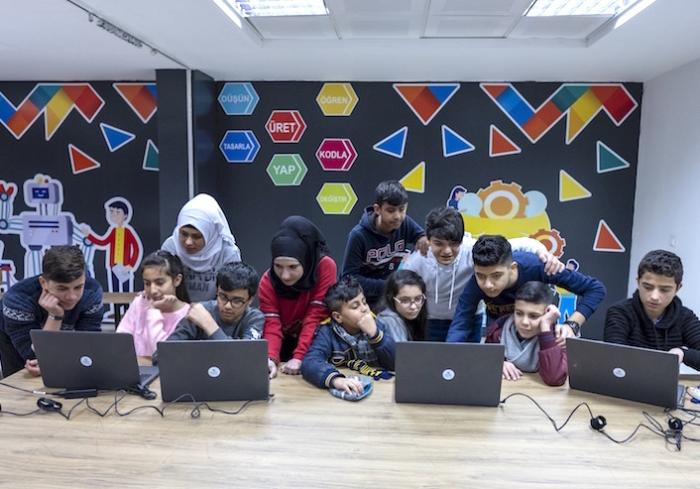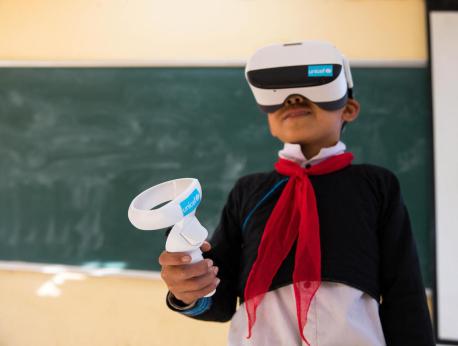UNICEF and SAP Partner to Power Opportunities for Young People
Investing in young people's education can create a more equitable and inclusive economy and society for all. That's why UNICEF and SAP are partnering to develop new ways of learning so that young people have the skills and opportunities they need to reach their full potential.
India 2020: Arpita Barua of Jaipur, a city in the state of Rajasthan, wants to be a wildlife photographer when she grows up. She has just completed secondary school. But, like the rest of the world, Arpita is affected by the pandemic and her future is uncertain.
In these times, the "Rajasthan Career Guidance Portal" gives her hope. The portal was launched by the state government and UNICEF and is supported by SAP. Arpita has discovered a wealth of information using the career portal: colleges, courses and multiple career streams. She also found scholarships that can support her while in college. She has gained a lot of confidence and is ready to follow her dream. But her story is the exception rather than the rule.
1.8 billion reasons to act now
There is a pressing need to provide young people around the world with access to quality education and 21st-century digital skills. We are facing a learning crisis for children and adolescents and COVID-19 has only exacerbated this crisis, with billions of young learners affected by school closures.
Today's young people represent the largest cohort ever — 1.8 billion — and they will be a dominant force in years to come. But 1 in 5 young people between the ages of 15 and 24 are not employed, educated or trained. Many are at risk of being left behind in the digital economy. Many are not learning the skills they need to get jobs as a fast-paced global economy demands increasingly specialized skills.
If current trends continue in low-income countries, only 8 percent of their young people will achieve a minimum level of secondary skills, compared to 70 percent in high-income countries.
Joining forces
The challenges are significant, but so are the opportunities. The growth of technology and the increasingly broad range of support from partners bring the potential to deliver learning opportunities anywhere, to anyone, at any time.
Partnerships are at the heart of how UNICEF works, and young people are at the heart of the partnership between SAP and UNICEF. In 2019, the two organizations embarked on a global partnership to address workforce readiness by equipping underserved youth with digital and life skills. The collaboration is reaching young people across Asia and Europe, with initial efforts focused on India, Turkey and Vietnam.
The partnership brings together UNICEF and SAP's vast, far-reaching ecosystems of businesses, governments and non-governmental partners and supports the development of standardized national curricula, workforce readiness programs and in-depth research to address gaps in secondary education.
With the support of SAP, a virtual High-Level Ministerial Conference on Digital Transformation of Education Systems throughout the Association of Southeast Asian Nations (ASEAN) was held in October 2020. Organized by the Ministry of Education of Vietnam, UNICEF Vietnam, UNICEF EAPRO and the ASEAN Secretariat, the event brought together education ministers of ten ASEAN countries, SAP, academia, development partners and young people, to discuss how education systems can be made more resilient through digital transformation and fostering digital literacy and transferable skills. © UNICEF Vietnam
Equipping underserved youth with 21st-century life skills
In India, the SAP-UNICEF partnership supports the "Young Social Change Makers" program. The program includes developing an integrated curriculum for life skills and social innovation skills with the government; a Learning Management System for use by teachers and students, the capacity building of teachers to measure skills and access to career guidance in order to reach learners.
The program is being implemented in secondary schools in the states of Gujarat and Rajasthan. The ultimate aim is to scale the program to more than 1 million adolescents through further uptake of the technical models and resources offered by the state and national government. New life skills and social innovation learning content have already been developed and digitalized. A career portal is also active in 12 states — including a mobile app — and a Life Skills Measurement Tool is available for use by teachers across the country.
Tackling the digital divide
In Vietnam, UNICEF, with support from SAP and in partnership with the government, has been scaling the development of digital learning curricula at the secondary school and TVET (Technical and Vocational Education and Training) levels — focusing on learning needs and tackling the digital divide for the most vulnerable adolescents.
To date, SAP and UNICEF have reached more than 1,600 teachers with digital education training. Moreover, UNICEF introduced Augmented and Virtual Reality education solutions in Vietnam's remote mountainous provinces, where students do not have access to teachers qualified in STEM (science, technology, engineering and mathematics) subjects. The partnership also supported the government to develop a "Transferable Skills and Digital Literacy Framework" for preschools, upper secondary schools and TVET education.
In addition, the partnership promoted the digital transformation on a regional level, leading to ten ASEAN member states making a commitment to foster digital literacy and create access to safe digital learning opportunities for all children and adolescents.
With the support of SAP, UNICEF and Turkey's Ministry of National Education formed a partnership for the "Design and Skills Labs" (DSL) program to help adolescents improve their skills and acquire practical knowledge. This initiative aims to expand vulnerable Turkish and refugee adolescents' access to technical and life skills.
SAP and UNICEF have established two new DSLs in upper-secondary schools and reached more than 350,000 children with ICT skills. A resource pack for teachers was developed to facilitate a successful implementation of the program. The Teacher's Manual has been used during training sessions with 500 teachers and coordinators from all 80 provinces in Turkey. The electronic version of the manual is also accessible via a portal of the Ministry of National Education.

With the support of SAP, UNICEF and Turkey's Ministry of National Education formed a partnership to create a Design and Skills Lab program that helps adolescents build capacity in problem-solving, critical thinking, productivity, teamwork, multiple-literacy and social-emotional skills. The initiative aims to expand access to technical and life skills training for vulnerable Turkish and refugee adolescents between the ages of 14 and 17. © UNICEF/UNI341466/Rich
Reimagined: the future of education
SAP's support has laid an important foundation for this generation of learners and thinkers, like Arpita from Jaipur. After using the career portal, she was admitted to the Bachelor of Arts program at government-run Brahampuri Kanwar Nagar College, where she studies geography, history and political science. Arpita has also enrolled in a Rajasthan state-run computer course on information technologies. She is now in her second year of the BA program and continues to take pictures using her mobile phone, eager to practice her photography skills and capture the diversity of the world with her lens. She has learned that there is a lot of information available about photography online as well as different tools and apps available.
Investing in quality education for young people puts them on a path to fulfill their dreams and live to their highest potential. It also benefits the world because productivity rises and standards of living improve. Preparing young people for tomorrow's world of work supports and benefits them, advances the Sustainable Development Goals and contributes to a better future for all.
The SAP and UNICEF partnership aims to reach 1.5 million young people in India, Turkey and Vietnam with 21st-century life skills training by 2022. This story originally appeared in Global Goals Yearbook 2021, a publication in support of the Sustainable Development Goals (SDGs) and the advancement of corporate sustainability globally.
Top photo: Adolescent girls participate in a UNICEF-supported peer education activity in Jharkhand State, India. © UNICEF/UN0215383/Vishwanathan
HOW TO HELP
There are many ways to make a difference
War, famine, poverty, natural disasters — threats to the world's children keep coming. But UNICEF won't stop working to keep children healthy and safe.
UNICEF works in over 190 countries and territories — more places than any other children's organization. UNICEF has the world's largest humanitarian warehouse and, when disaster strikes, can get supplies almost anywhere within 72 hours. Constantly innovating, always advocating for a better world for children, UNICEF works to ensure that every child can grow up healthy, educated, protected and respected.
Would you like to help give all children the opportunity to reach their full potential? There are many ways to get involved.




